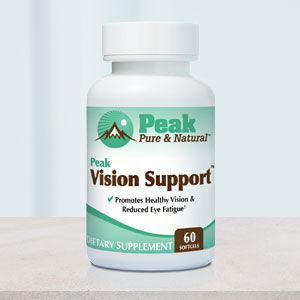Get Easy Health Digest™ in your inbox and don’t miss a thing when you subscribe today. Plus, get the free bonus report, Mother Nature’s Tips, Tricks and Remedies for Cholesterol, Blood Pressure & Blood Sugar as my way of saying welcome to the community!
The obesity-AMD connection and the nutrient that helps both

In the short term, inflammation is a good thing. It’s part of the healing process.
Acute inflammation fights off foreign invaders (bacteria) and helps heal an injury.
But in the long run, inflammation is harmful, especially when it attacks the nervous system. Then, you end up with things like Alzheimer’s disease, multiple sclerosis or Parkinson’s disease.
Or, you become a target for age-related macular degeneration (AMD), especially if you already have a genetic predisposition to the disease.
And if you’re obese, it’s like fuel on an AMD fire…
Why do some people get AMD and others don’t?
A research team at Maisonneuve-Rosement Hospital in Montreal has shown how the systemic stress of obesity can reprogram immune system cells and make them more destructive to the eye as it ages.
They already knew that the immune system in the eye of a person with AMD becomes aggressive and begins to destroy healthy cells.
They also knew that exposure to the chronic stress of carrying excess fat also causes immune cells to become overactive.
But there was more they didn’t know…
“We wanted to know why some people with a genetic predisposition develop AMD while others are spared,” said Université de Montréal ophthalmology professor Przemyslaw Sapieha, who led the study.
The team found that being obese leads to permanent changes in the DNA of immune cells, making them more likely to produce inflammatory molecules.
They also found that “diet-induced obesity earlier in life triggers persistent reprogramming of the innate immune system, lasting long after normalization of metabolic abnormalities.”
In other words, being obese prior to your 50s, when AMD tends to show up, can predispose you to the disease — even after the obesity has been resolved.
Weight loss + eye health protection
The researchers hope that their findings will encourage other scientists to take a look at diseases like Alzheimer’s and multiple sclerosis, which are characterized by increased neuroinflammation, to see what role obesity might play.
In the meantime, there’s no harm in working to get your weight to a healthy level and keeping it there. You may be protecting your future eyesight, but you’ll definitely be cutting your risks for diabetes, heart disease, stroke and early death.
The Green Mediterranean diet has been proven to be effective in the fight against visceral fat, better known as “belly fat,” which can be difficult to shed.
It’s a diet that is also rich in the precise nutrition that the American Academy of Ophthalmology recommends to help slow progression of dry AMD, including the carotenoids lutein and zeaxanthin, found in green leafy vegetables, along with vitamins C and E, zinc and copper.
And here’s a big plus: Lutein may also help with weight loss…
That’s because it’s considered “a major biologically active carotenoid, with potential benefits for obesity and cardiometabolic health.”
According to research in the British Journal of Nutrition, lutein supplementation in combination with a low-calorie diet could improve body composition and lipid profile in obese middle-aged individuals.
Get started today towards healthy weight and eyesight that lasts.
Editor’s note: Did you know that when you take your body from acid to alkaline you can boost your energy, lose weight, soothe digestion, avoid illness and achieve wellness? Click here to discover The Alkaline Secret to Ultimate Vitality and revive your life today!
Sources:
Obesity linked to macular degeneration — Science Daily
The Obese Brain: Mechanisms of Systemic and Local Inflammation, and Interventions to Reverse the Cognitive Deficit — Frontiers in Integrative Neuroscience
Lutein supplementation combined with a low-calorie diet in middle-aged obese individuals: effects on anthropometric indices, body composition and metabolic parameters — British Journal of Nutrition
Nutrition for Age-Related Macular Degeneration — Macular Disease Foundation Australia













